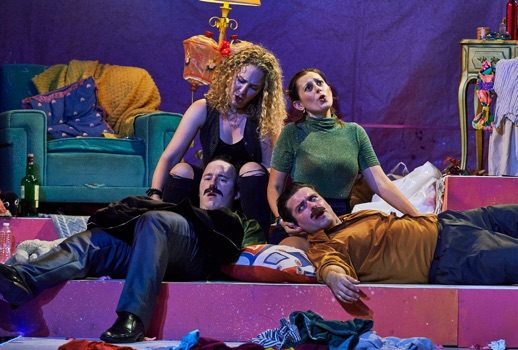
The story of two young men testing the fidelity of their fiancées is, when considered on its most basic level, creepy and unsettling. The anxiety of masculinity, the desire to regulate female sexuality, and the threats of domestic violence lurking beneath such comedic accusations as “Briccona! Assassina…furfante… ladra… cagna…” make this opera slightly difficult to stomach—at least, on an ethical level.
I am certain that some will bristle at my identity politics. But let me clear: I’m not necessarily arguing that we throw the baby out with the bathwater. My question regarding Cosí fan tutte is an old question (and, as some may argue, a tedious and exhausting question), and I certainly don’t intend to answer it here.
However, I will argue that any production of an opera that holds female sexuality in such low regard ought to at least wrestle with the unworkability and distaste of these notions. Otherwise, the results seem preposterous, the implications of the narrative excruciatingly naïve, if not downright stupid. In other words, rather than whitewash a text of its original misogyny, why not at least engage those ideas if only to subvert, complicate, and transform them?
In regard to LoftOpera’s production, I expected Louisa Proske’s staging to pose some kind of feminist intervention on Mozart and Da Ponte’s text, not simply because she is a woman, but because she is an intelligent director with a hip sensibility. But her polished production glibly moved toward the opera’s misogynistic conclusions without much ambivalence. Teetering on the edge of recklessness, there was a dash of spontaneity in her staging, including scattered rose petals, hallucinatory drugs, and tossed empty beer cans.
This was all well choreographed and pleasant, but the discomfort of Don Alfonso’s sexism, and the darker, creepier aspects of Guglielmo and Ferrando’s sexual surveillance went unchecked and unexplored. Instead, the audience was given two good old boys who just wanted to make sure they’re girlfriends loved them; and Fiordiligi and Dorabella remained passive within their lovers’ web of deceit.
Moreover, Proske’s Così… occurs within a period of female empowerment (somewhere post-sixties? It’s not quite clear), a time in which Guglielmo and Ferrando’s test would be understood in a different context than the one intended by Da Ponte and Mozart, one laden with feminist politics, complicated by liberation narratives. Proske does not make room for these perspectives within the universe she has created, and so this Cosí… feels a bit anachronistic to me, detached from the compelling concerns swirling at the opera’s core.
However, and I know how hypocritical this may sound, I would be lying if I were to say that I didn’t enjoy myself. I had a good time. And indeed, LoftOpera has a canny way of making opera fun. Produced in a cavernous warehouse in Bushwick, serving beer, with a laid-back, casual approach to opera going, LoftOpera is a wonderful alternative to the stuffier, bourgeois proceedings at Lincoln Center.
Regarding the actual production, I believe that the evening’s success truly hinged on the charisma and talent of the four young lovers. As Fiordiligi and Dorabella, Megan Pachecano and Sarah Nelson Craft were excellent, believable within their roles, while remaining vocally reliable. Despite the cognitive dissonance I felt about their setting and situation, both singers were able to build fully realized characters.
As their male counterparts, Ferrando and Guglielmo, Spencer Viator and Alex DeSocio were equally magnetic, with easy, unfussy swagger, and admirable singing. Their athletic and raucous commitment to the zaniness of their situations added to the evening considerably.
Unfortunately, the performance’s few weak links resided with the adults—Don Alfonso and Despina. As Despina, the overworked maid, Michelle Trovato provided a delightful, subversive element; she was an expert comic actress. However, her voice, while splendid on top, sounded coarse and threadbare in the middle. At times, she used this deficiency to her advantage, specifically while in disguise as the doctor and the notary; but ultimately it was a distraction, especially in contrast with Pachecano and Craft’s fluid, robust singing.
Similarly, Gary Ramsey, as Don Alfonso, lacked vocal elegance. This was most disappointing during the trio, “Soave sia il vento,” in which his baritone was poorly matched with the pliant and luminous Craft and Pachecano. Also, Ramsey’s Don Alfonso was dramatically a mismatch for the effervescence surrounding him. Menacing, and philosophically unmovable, his Don Alfonso indoctrinated Ferrando and Guglielmo into the patriarchal stances of distrust and control that construct the opera’s ethos. However, Ramsey did this without providing the necessary charisma to make his case rhetorically effective.
The orchestra, conducted by Dean Buck, sounded well rehearsed and vital, moving the evening along vigorously. I was especially impressed when a piece of clothing, thrown from the stage, landed on a French horn player. He was not distracted a bit, keeping his attention fixed on the maestro’s conducting.
Ultimately, I would describe LoftOpera’s performance of Cosí fan tutte as a mixed bag: a lack of rigor with a dollop of youthful talent. Yes, I enjoyed myself. But this was something of a guilty pleasure, and not the more scrupulous reading of the opera I had hoped for. In any event, LoftOpera continues to do what they do best, which is to offer audiences fun operatic performances in a context that feels fresh and alive. And, honestly, if that is all there is to recommend this performance, I’ll definitely take it.
Photo: Robert Altman



